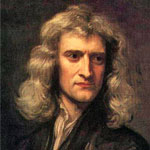Newtonmas (Newton’s Birthday) Date in the current year: December 25, 2026
 Isaac Newton was a renowned English mathematician, physicist, astronomer, theologian, and author who is widely considered to be one of the most influential scientists of all time. Thanks to his enormous contribution to science Newton, alongside Albert Einstein, became a scientific icon. To celebrate his work, many scientists, science communicators, educators and science enthusiasts celebrate his birthday, and not once, but twice a year.
Isaac Newton was a renowned English mathematician, physicist, astronomer, theologian, and author who is widely considered to be one of the most influential scientists of all time. Thanks to his enormous contribution to science Newton, alongside Albert Einstein, became a scientific icon. To celebrate his work, many scientists, science communicators, educators and science enthusiasts celebrate his birthday, and not once, but twice a year.How come does Isaac Newton has two birthdays instead of one? The answer is actually pretty simple. At the time of his birth, Protestant England was using the Julian calendar, whereas most Catholic countries had adopted the Gregorian calendar. According to the Julian calendar, Newton was born on December 25, 1642, but his birth date according to the Gregorian calendar is January 4, 1643.
Even though today most of the world uses the Gregorian calendar, Newton’s birthday is traditionally celebrated on December 25 because it coincides with Christmas. It is believed that this celebration originated from a Christmas meeting of the Newton Association back in 1890.
A century later, the Skeptics Society (whose members, by the way, include Neil Degrasse Tyson, Bill Nye, Richard Dawkins and other well-known scientists and science communicators) invented the name “Newtonmas” as an alternative name for its Christmas party. It combines Newton’s name with a tongue-in-cheek reference to Christmas. Another name for Newton’s birthday is Gravmass (also spelled Grav-mass or Gravmass). Gravmass is short for “gravitational mass”; this name is an homage to Newton’s theory of gravitation and, once again, a Christmas reference.
Some scientists and science enthusiasts, however, prefer to celebrate Newton’s birthday on January 4, according to the Gregorian calendar, and some celebrate both dates. The period between Newton’s two birth dates is sometimes referred to as “10 Days of Newton”.
Indeed, ten days may be enough, but only barely, to celebrate all of Newton’s achievements. In addition to formulating the law of universal gravitation, he formulated the law of motion, proved Kepler’s laws of planetary motion, laid the foundation of classical mechanics, built the first practical telescope, developed a theory of color, and more. His magnum opus is Philosophiæ Naturalis Principia Mathematica (Mathematical Principles of Natural Philosophy).
- Category
- Cultural Observances
- Tags
- Newton’s birthday, Newtonmas, Gravmass, cultural observances, Isaac Newton